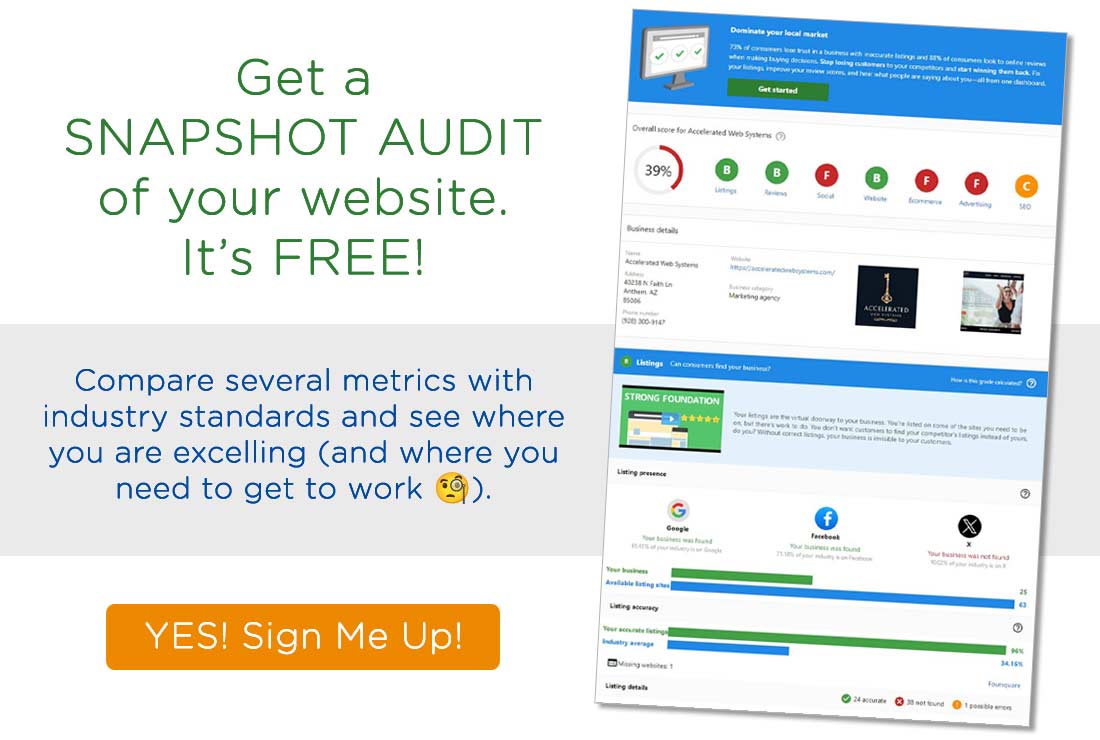What is Your Website and Marketing Contingency Plan?
As a business owner, you may not think much about what would happen to your website or marketing accounts in the event of an unexpected life event. Yet, having a contingency plan in place for your website and digital marketing assets is crucial—not only for the health of your business but also for the peace of mind of your web professional or marketing consultant.
I’ve encountered situations where clients went through divorces, disappeared, found themselves in legal trouble, or even tragically passed away. Each of these scenarios presented a unique set of challenges, particularly when I was approached by someone other than the client asking for access to accounts or other sensitive business assets. This puts web professionals, like me, in a tricky—and risky—position. To avoid complications, misunderstandings, or even legal liabilities, a contingency plan is essential.
Why You Need a Contingency Plan
Having a contingency plan ensures that your business continues to function smoothly, even if you are unable to oversee your website or marketing operations. It also protects your business’s online presence from disruption, mismanagement, or unauthorized access in the event of your absence.
Here are some scenarios to consider:
- Health Emergencies: You or a key team member may face a medical situation that prevents ongoing management of your online accounts.
- Legal or Financial Issues: Problems like lawsuits, bankruptcy, or even imprisonment can cause an immediate need to transfer or freeze assets.
- Partnership Dissolution or Divorce: Business disputes, separations, or divorces may lead to disagreements about who controls the website and marketing accounts.
- Volunteers Quitting: If your organization relies on volunteers to help manage your website or marketing, you need a contingency plan in case they quit unexpectedly. Volunteers may not provide notice, leaving you scrambling to regain access or manage accounts they handled.
- Unexpected Death: Tragically, a business owner’s death can leave a gaping hole in account access and management if not prepared for.
Risks for the Business Owner and the Web Professional
As a business owner, losing access to your website and marketing accounts can result in loss of leads, revenue, and reputation. Worse, it can allow unauthorized individuals to make damaging changes to your online assets.
On the flip side, web professionals, including digital marketers and web developers, are often the ones who get contacted by third parties seeking access to these accounts. Without clear guidance, they may be put in a vulnerable position. Web professionals must balance the need to maintain the integrity of their client’s business with the potential legal and ethical risks of handing over sensitive information to someone who isn’t the original client.
The Essentials of a Website and Marketing Contingency Plan
Clear Ownership and Access Documentation
One of the biggest issues in these situations is account ownership. Business owners should clearly document who owns each digital asset. This includes domain names, hosting accounts, social media profiles, and email marketing platforms.
For example, make sure:
- The domain name is registered under your company’s name or a trusted person rather than under the name of an individual web professional.
- You keep an updated record of all account credentials (usernames, passwords, recovery emails) in a secure, accessible location, like a password manager.
- You determine who is authorized to access these accounts in your absence, and have this written into legal documentation, such as your will or a business continuity plan.
Designate Trusted Individuals or Successors
You should designate who will take over managing your website and marketing accounts if you can’t. This might be a business partner, family member, or even a trusted employee. However, don’t stop at naming someone—ensure they have the necessary knowledge and access to smoothly take over responsibilities. It’s wise to establish this as part of your business continuity or succession plan.
Consider working with your legal team to create a formal agreement or power of attorney that outlines who can access your business’s digital assets and under what circumstances.
Service Agreements and Communication with Web Professionals
For web professionals, it’s important to create service agreements that clarify:
- What happens if the client is unreachable for a certain period.
- What steps will be taken in the event of the client’s death or legal incapacity.
- Who, besides the client, is authorized to request account access or make changes.
These agreements should include clauses protecting you from being held liable for unauthorized access and provide a clear plan for how to verify requests in sensitive situations.
In addition, encourage open communication with your clients. Periodically review access points and plans with them so that everyone is aligned on expectations should anything go awry.
Regularly Update and Backup Your Website
Both business owners and web professionals should ensure that all website files, databases, and digital marketing materials are regularly backed up and stored in a secure location. This allows for swift recovery if accounts are compromised or if a designated individual needs to step in and take over.
Automated backups and regular audits of accounts can help safeguard against loss or tampering in the absence of the primary account holder.
Legal and Ethical Considerations
In many unfortunate scenarios, emotions and business concerns collide. As a web professional, you might be put in a position where two parties are claiming access rights—such as in a divorce or after the death of a client. In these cases, legal guidance is vital. Don’t make unilateral decisions; insist on seeing legal documentation before handing over access to any accounts.
Similarly, for business owners, consulting a legal professional about the creation of digital asset transfer clauses in your estate plan or partnership agreements can prevent confusion and disputes later on.
Connected Online Accounts
Here’s a list of possible online accounts that your website might be connected to in some way, covering all aspects of website management, marketing, and operations:
Website-Related Accounts:
Domain Registrar (e.g., GoDaddy, Namecheap)
Web Hosting Provider (e.g., Bluehost, SiteGround, WP Engine)
Content Management System (CMS) Login (e.g., WordPress, Joomla, Wix, Squarespace)
Website Builder Platform (e.g., Shopify, Weebly, Squarespace)
FTP/SFTP Access (File Transfer Protocol for server file management)
CDN (Content Delivery Network) (e.g., Cloudflare, StackPath)
SSL Certificate Provider (e.g., Let’s Encrypt, Comodo)
Email Hosting Provider (e.g., G Suite, Zoho Mail)
DNS Management (e.g., Cloudflare, AWS Route 53)
Database Access (e.g., phpMyAdmin, MySQL)
Marketing & Analytics Accounts:
Google Analytics
Google Tag Manager
Google Search Console
Bing Webmaster Tools
Google Ads (PPC)
Facebook Ads Manager
LinkedIn Campaign Manager
Instagram Business Account
Twitter Ads
Pinterest Business Account
Google My Business (now Google Business Profile)
Email Marketing Platforms (e.g., Mailchimp, Constant Contact, ActiveCampaign)
Social Media Management Tools (e.g., Hootsuite, Buffer, Sprout Social)
Affiliate Marketing Platforms (e.g., ShareASale, Commission Junction)
Marketing Automation Platforms (e.g., HubSpot, Marketo)
E-commerce & Payment Systems:
E-commerce Platforms (e.g., Shopify, WooCommerce, BigCommerce)
Payment Gateway Accounts (e.g., PayPal, Stripe, Square)
Shopping Cart Software
Accounting Software (e.g., QuickBooks, FreshBooks, Xero)
Shipping Software (e.g., ShipStation, EasyShip)
Communication & Collaboration:
Live Chat Software (e.g., Intercom, Drift, LiveChat)
Customer Support Ticketing (e.g., Zendesk, Freshdesk)
CRM (Customer Relationship Management) Software (e.g., Salesforce, HighLevel, Hubspot, Zoho CRM)
Slack/Team Communication Tools
Website Plugins & Add-ons:
WordPress Plugins/Extensions (e.g., Yoast SEO, Elementor, WooCommerce)
Email Opt-In Plugins (e.g., OptinMonster, MailOptin)
Backup Services (e.g., UpdraftPlus, BackupBuddy)
Security Plugins/Services (e.g., Wordfence, Sucuri)
Performance Plugins (e.g., WP Rocket, W3 Total Cache)
Miscellaneous Online Tools:
Graphic Design Tools (e.g., Canva, Adobe Creative Cloud)
Stock Photo Accounts (e.g., Shutterstock, Unsplash)
Online Form Builders (e.g., Gravity Forms, Wufoo, Typeform)
Surveys/Feedback Tools (e.g., SurveyMonkey, Google Forms)
A/B Testing Tools (e.g., Optimizely, VWO)
Heatmap Tools (e.g., Hotjar, Crazy Egg)
Cloud & File Storage:
Cloud Storage (e.g., Google Drive, Dropbox, OneDrive)
File Sharing Platforms (e.g., WeTransfer, Box)
Having a clear record of these accounts, access credentials, and who is authorized to manage them will be vital in any website and marketing contingency plan.
Protecting Your Business for the Long Term
A website and marketing contingency plan is one of the most overlooked aspects of a digital marketing strategy, but it is arguably one of the most important. Life is unpredictable, and being prepared with a plan ensures your business—and your relationship with your web professional—remains secure and operational, even in the most challenging circumstances.
By implementing these steps, business owners can have peace of mind, and web professionals can navigate tricky situations with a clear process that protects both parties.
Don’t wait for a crisis to happen! Put your website and marketing contingency plan in place today to ensure a smooth transition in any situation.
Ready to improve your website or digital strategy?
Let us help you assess your website’s performance and decide if you need a redesign, or if your efforts are better spent elsewhere. Get in touch with us today to schedule an evaluation and take the first step toward a more effective digital presence that converts.
Why choose Accelerated Web Systems?
✔️ We believe in nuance, alignment, and consistent, relentless work. You are not just a number with us.
✔️ We dive deep into your unique business proposition, your ideal client persona, and your revenue goals.
✔️ We evaluate your current situation in the search engines from many angles to establish a benchmark before we start. Keywords, competition, reviews, Google properties, website speed, and website conversion rates all play a part in a successful Inbound Marketing campaign.
✔️ We research, strategize, plan, and execute for short and long-term success.
✔️ You can count on our digital marketing services being comprehensive, clever, creative, and competitive.
✔️ We have been professionally designing websites for over 20 years and have the experience it takes to elevate your business!



